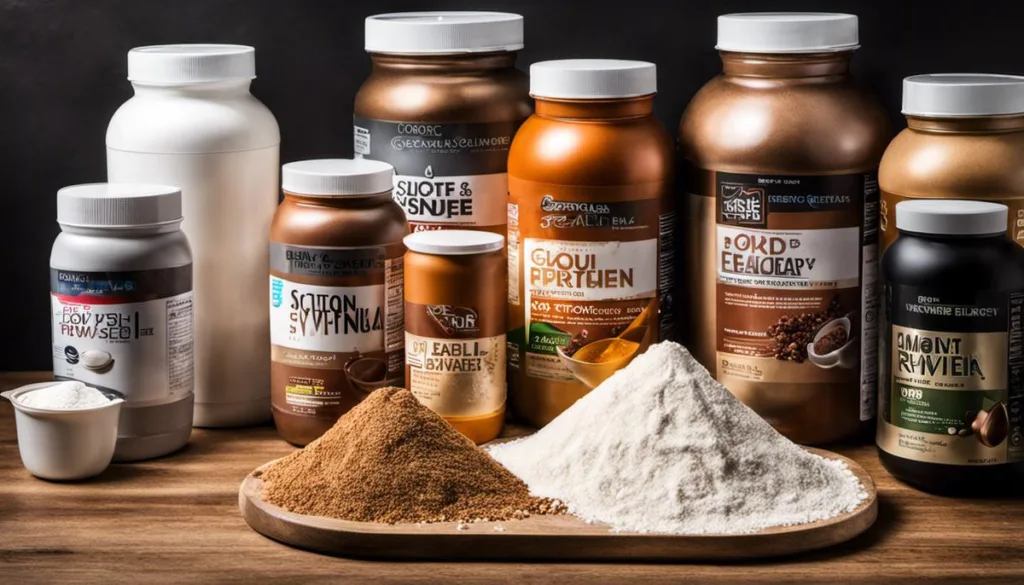Looking to shed those extra pounds? One essential ingredient in your weight loss journey is protein powder. With a myriad of options available in the market, it can be overwhelming to choose the right one. That’s why we’ve created the ultimate guide to help you make an informed decision. In this comprehensive blog post, we will delve into the world of protein powders, exploring their benefits, different types, and factors to consider when selecting the perfect one for your weight loss goals. Get ready to discover the power of protein and take your weight loss journey to the next level.

Why Protein Powder is Important for Weight Loss
Protein powder has gained immense popularity in the fitness and weight loss community for its ability to support and enhance weight loss efforts. In this section, we will explore why protein powder is crucial for achieving weight loss goals, providing you with the necessary knowledge to make an informed decision.
1. Boosts Metabolism and Burns Calories
Protein powder is a fantastic tool for weight loss due to its impact on metabolism. When consumed, protein requires more energy to digest than other macronutrients, such as carbohydrates or fats. This process, known as the thermic effect of food, results in the burning of additional calories. By incorporating protein powder into your diet, you can effectively boost your metabolism, helping you burn more calories throughout the day, even at rest.
2. Increases Satiety and Curbs Cravings
One of the key challenges in weight loss is managing hunger and cravings. Protein powder can be immensely helpful in this regard. Protein has a high satiety value, meaning it keeps you feeling full and satisfied for longer periods. By consuming protein powder, you can reduce the overall calorie intake by curbing unnecessary snacking and overeating.
3. Preserves Lean Muscle Mass
During weight loss, it is essential to preserve lean muscle mass. When you reduce calories, your body may start breaking down muscle tissue for energy, which can hamper your weight loss goals. Protein powder contains essential amino acids that aid in muscle preservation and promote muscle recovery and growth. By incorporating protein powder into your diet, you can support your muscles while losing fat, ensuring a toned and sculpted physique.
4. Facilitates Nutrient Timing and Convenience
Protein powder offers convenience and flexibility when it comes to nutrient timing. It can be easily incorporated into various recipes and meals, making it an ideal choice for individuals with busy lifestyles. Additionally, protein powder can be consumed before or after workouts, ensuring the body receives the necessary nutrients for muscle repair and recovery. This convenience factor allows you to optimize your weight loss efforts without compromising on nutrition.
5. Supports Overall Health and Well-being
While protein powder is primarily associated with weight loss, it also offers several health benefits. Protein is crucial for the proper functioning of various bodily processes, including the immune system, hormone production, and the repair of cells and tissues. By incorporating protein powder into your weight loss journey, you not only achieve your desired physique but also promote overall health and well-being.
In conclusion, protein powder plays a vital role in weight loss by boosting metabolism, increasing satiety, preserving lean muscle mass, offering convenience, and supporting overall health. With its numerous benefits, protein powder is a valuable addition to any weight loss plan.
Types of Protein Powders
Protein powders are an essential supplement for individuals seeking to lose weight and promote muscle growth. With so many options available, choosing the right protein powder can be overwhelming. In this section, we will explore the different types of protein powders commonly used for weight loss: Whey Protein Powder, Casein Protein Powder, Soy Protein Powder, and Pea Protein Powder.
Whey Protein Powder
Whey protein powder is one of the most popular choices among fitness enthusiasts and those looking to shed pounds. It is derived from milk and contains high levels of essential amino acids, making it an excellent option for muscle recovery and growth. Whey protein powder is easily digestible and quickly absorbed by the body, making it ideal for post-workout supplementation.
- Whey protein isolate has a higher protein concentration and minimal lactose content compared to whey protein concentrate, making it a suitable choice for individuals with lactose intolerance.
- Whey protein hydrolysate is pre-digested, allowing for rapid absorption and utilization by the body.
Casein Protein Powder
Casein protein powder is another milk-derived protein powder that offers distinct benefits. Unlike whey protein, casein protein is slowly digested, releasing a steady stream of amino acids into the bloodstream. This slow release makes it an excellent option for providing prolonged satiety, helping to curb hunger and control calorie intake.
- Casein protein powder is commonly consumed before bedtime, as its slow digestion provides a sustained release of amino acids throughout the night.
Soy Protein Powder
Soy protein powder is derived from soybeans and is a popular choice for individuals following a plant-based or vegetarian diet. It is a complete protein source, meaning it contains all essential amino acids required by the body. Soy protein powder has been shown to be effective in promoting muscle growth and aiding weight loss.
- Soy protein isolate has a higher protein content and lower carbohydrate and fat content compared to soy protein concentrate.
Pea Protein Powder
Pea protein powder is an excellent alternative for those with dairy or soy allergies or dietary restrictions. Derived from yellow peas, it is a highly digestible and hypoallergenic protein source. Pea protein powder is rich in branched-chain amino acids (BCAAs) and has been shown to support muscle recovery and promote a feeling of fullness.
- Pea protein isolate has a higher protein concentration compared to pea protein concentrate, making it a preferred choice for individuals focusing on protein intake.
To determine the most suitable protein powder for your weight loss goals, consider factors such as your dietary preferences, any specific allergies or intolerances, and your individual fitness routine. Consulting with a healthcare professional or registered dietitian can also provide personalized guidance in selecting the optimal protein powder for your needs.
Remember, choosing the right protein powder is just one piece of the weight loss puzzle. Incorporating it into a well-rounded nutrition and exercise plan is essential for achieving your desired results.
Considerations When Choosing Protein Powder for Weight Loss
When it comes to selecting the right protein powder for weight loss, there are several key factors to consider. By understanding these considerations, you can make an informed choice that aligns with your goals. Let’s explore the important factors when choosing a protein powder for weight loss.
Protein Content
The protein content of your chosen protein powder is crucial for weight loss. Protein is a macronutrient that plays a significant role in building and repairing body tissues. It also helps in increasing satiety and boosting metabolism, which aids in weight loss. Look for protein powders that have a high protein content per serving, ideally around 20-30 grams.
Carbohydrate and Sugar Content
When aiming for weight loss, it’s important to keep an eye on the carbohydrate and sugar content of your protein powder. While some carbohydrates are necessary for energy, excessive amounts can hinder your weight loss efforts. Choose a protein powder that is low in carbohydrates and sugars, preferably less than 5 grams per serving.
Fat Content
While fat is an essential nutrient, it’s crucial to consider the fat content in your protein powder, especially if weight loss is your goal. Opt for protein powders that are low in fat, ideally with less than 3 grams per serving. This will help keep your overall calorie intake in check and support your weight loss journey.
Calorie Content
Calories play a significant role in weight management, so it’s important to be mindful of the calorie content in your protein powder. Look for options that offer a reasonable calorie count per serving, typically ranging from 100 to 150 calories. This will ensure that you’re not consuming excessive calories while still getting the protein you need.
Artificial Ingredients and Additives
When choosing a protein powder for weight loss, it’s best to avoid those with artificial ingredients and additives. These can include artificial sweeteners, flavors, and coloring, which may not align with your goal of achieving a healthier lifestyle. Opt for protein powders that are free from artificial additives to ensure a cleaner and more natural product.
Allergens
If you have any known allergies or sensitivities, it’s crucial to check the ingredient list of your chosen protein powder. Common allergens found in protein powders include soy, dairy, and gluten. Select a protein powder that is free from any allergens you need to avoid to support your weight loss journey without compromising your health.
By considering these factors – protein content, carbohydrate and sugar content, fat content, calorie content, artificial ingredients and additives, and allergens – you can make an informed decision when choosing the right protein powder for weight loss. Keep these considerations in mind and find a protein powder that aligns with your specific needs and goals.

How to Determine Protein Needs for Weight Loss
Choosing the right protein powder for weight loss starts with understanding your specific protein needs. By considering factors such as your body weight and activity level, you can determine the recommended daily protein intake for effective weight loss.
Body Weight and Activity Level
Determining your protein needs begins with knowing your body weight and activity level. These factors play a crucial role in calculating the appropriate amount of protein to support weight loss goals.
If you lead a sedentary lifestyle or engage in light activity, such as office work or minimal exercise, a general guideline is to consume 0.36 grams of protein per pound of body weight. For example, if you weigh 150 pounds, your protein intake would be approximately 54 grams per day.
On the other hand, if you have an active lifestyle, including moderate to intense physical activity or regular exercise, you may require a higher protein intake. In such cases, the recommended protein consumption ranges from 0.5 to 0.8 grams per pound of body weight.
Understanding your body weight and activity level provides a foundation for calculating your protein needs accurately.
Daily Protein Intake Recommendations
To determine the appropriate protein intake for weight loss, it’s essential to be aware of the daily recommendations as provided by experts and health organizations.
The Recommended Dietary Allowance (RDA) suggests that the average sedentary adult should consume about 0.8 grams of protein per kilogram of body weight. This translates to around 0.36 grams per pound. However, for individuals aiming for weight loss, slightly higher protein intake may be beneficial.
For those engaging in regular exercise or physical activity, the International Society of Sports Nutrition recommends an intake of 1.4 to 2.0 grams of protein per kilogram of body weight. This equates to approximately 0.64 to 0.91 grams per pound.
By following these guidelines, you can ensure an adequate protein intake that supports weight loss while preserving lean muscle mass.
Now that you understand the importance of considering your body weight and activity level, as well as the recommended daily protein intake for weight loss, you are equipped with the knowledge necessary to choose the right protein powder for your needs.
Choosing Protein Powder Based on Individual Goals
When it comes to achieving your health and fitness goals, selecting the right protein powder can make a significant difference. Protein powders are not one-size-fits-all, as different formulations cater to various goals. Whether you aim to build muscle, lose weight, or replace a meal, understanding the options available is essential for making an informed choice.
Building Muscle
For individuals looking to build muscle, a protein powder that promotes muscle growth and aids in muscle recovery is crucial. Look for a powder that contains a combination of fast-acting proteins, such as whey protein isolate or hydrolysate, along with slower-digesting proteins like casein. This blend ensures a steady supply of amino acids to support muscle repair and growth.
Additionally, consider protein powders with added branched-chain amino acids (BCAAs). BCAAs, including leucine, isoleucine, and valine, play a vital role in muscle protein synthesis and can enhance muscle-building results. Opting for a powder with added creatine can also provide an extra boost for improved strength and performance during workouts.
Weight Loss
For those aiming to shed some pounds, protein powders can be a valuable tool in supporting weight loss efforts. When selecting a protein powder for weight loss, it’s important to choose one that helps control appetite and keeps you feeling full for longer periods. Look for powders that are low in carbs and fats, as well as high in protein content.
Whey protein isolate or a blend of plant-based proteins can be great options for weight loss due to their high protein content and minimal carbohydrates and fats. These powders provide essential amino acids while keeping calorie intake in check. Additionally, some protein powders specifically formulated for weight loss may contain added ingredients like green tea extract or L-carnitine, which can facilitate fat burning.
Meal Replacement
When convenience and time are priorities, using a protein powder as a meal replacement can be an excellent option. Meal replacement powders typically contain a balanced mix of macronutrients, including proteins, carbohydrates, and healthy fats, along with essential vitamins and minerals. These powders offer a quick and easy solution for those on the go or looking to control their calorie intake.
Look for meal replacement powders that offer a good amount of protein, fiber, and healthy fats to ensure adequate nutrition. Depending on your dietary preferences, you can choose from whey-based, plant-based, or even meal replacement powders that cater to specific dietary restrictions or allergies.
By selecting a protein powder that aligns with your individual goals, you can optimize your fitness journey and ensure you’re providing your body with the nutrients it needs. Remember, always consult with a healthcare professional or registered dietitian before making any significant changes to your diet or supplementation routine.

Tips for Incorporating Protein Powder into a Weight Loss Plan
Smoothies and Shakes
Adding protein powder to your smoothies and shakes can be a convenient and delicious way to boost your protein intake while on a weight loss plan. Here are some tips to make the most out of your protein-packed beverages:
- Choose the right protein powder: Opt for a high-quality protein powder that aligns with your dietary preferences and goals. Whey, casein, soy, and plant-based proteins are popular options. Select a powder with minimal added sugars and artificial ingredients.
- Balance macros: To create a well-rounded and satisfying smoothie, be sure to include other nutrients like fruits, vegetables, healthy fats, and fiber. This will help keep you fuller for longer and support your weight loss efforts.
- Experiment with flavors: Play around with different flavor combinations to find the perfect taste. Add fruits like berries, bananas, or mangoes for natural sweetness. You can also incorporate ingredients like cocoa powder, cinnamon, or nut butter for added flavor depth.
- Control portion sizes: While protein is an important macronutrient for weight loss, it’s still essential to be mindful of portion sizes to avoid overconsumption of calories. Follow the recommended serving size guidelines provided by the protein powder manufacturer.
- Blend with liquid: To achieve a smooth and creamy texture, blend your protein powder with your choice of liquid such as milk (dairy or plant-based), water, or unsweetened yogurt. Adjust the amount of liquid based on your desired consistency.
Baking and Cooking
Protein powder can also be incorporated into your favorite baked goods and cooked dishes, offering a creative way to add nutrition and flavor. Consider the following tips when using protein powder in your recipes:
- Choose the appropriate powder: Different protein powders have varying textures, flavors, and heat stability. Select a protein powder that is suitable for baking and cooking. Whey protein isolate and casein powder are commonly used in recipes due to their versatility.
- Find recipes designed for protein powder: Look for recipes specifically created to incorporate protein powder. These recipes have already accounted for the unique properties of protein powder, ensuring successful results.
- Replace a portion of flour: In many recipes, you can replace a portion of the flour with protein powder. Start with substituting up to 25% of the flour and gradually adjust based on the desired texture and taste.
- Add moisture: Protein powder can absorb liquid, so it’s advisable to increase the amount of liquid (such as milk or water) in your recipe or include additional moisture-rich ingredients like applesauce or yogurt.
- Experiment with flavors: Protein powder comes in various flavors, such as vanilla, chocolate, or strawberry. Choose a flavor that complements your recipe and enhances the overall taste.
Incorporating protein powder into your weight loss plan doesn’t have to be boring. Whether you prefer smoothies and shakes or enjoy baking and cooking, these tips will help you maximize the benefits of protein powder while adding variety and flavor to your meals. Get creative, experiment with different combinations, and enjoy the journey to a healthier you.

Conclusion
In conclusion, choosing the right protein powder for weight loss can be a challenging task. With so many options available in the market, it’s important to consider your specific needs, preferences, and goals. Remember to look for protein powders that are low in calories, fat, and sugar, while being high in quality protein. Additionally, consider factors such as taste, texture, and any dietary restrictions you may have. By taking all these factors into account, you can make an informed decision and find the protein powder that best supports your weight loss journey.
Thank you for reading this post, don't forget to subscribe to our free newsletter
!